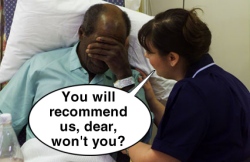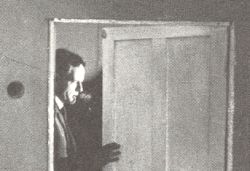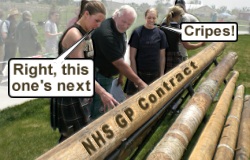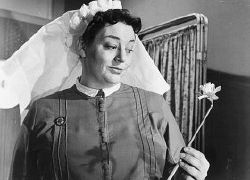 Paul Corrigan, whose posts show a worrying trend towards titles so long they stand as posts in their own right, has declared himself a friend of FFT, the punter-friendly friends and family test based on asking patients at or soon after discharge whether they would recommend the unit they have just left to friends and family. The test is popular with government for its apparent simplicity, resented by managers for the real extra burden it imposes, and derided by front-line staff, for whom the test might be better known as the Flying F*ck Test: the punters don’t give a FF about responding, and we don’t give a FF about the results. Although first announced last year, FF testing was back in the news last week after friendly we’re all in this together Dave announced plans to extend FF testing to general practice. The news got a cool response from senior GPs; others went further. One called the test ‘meaningless’; another dubbed it ‘trite’.
Paul Corrigan, whose posts show a worrying trend towards titles so long they stand as posts in their own right, has declared himself a friend of FFT, the punter-friendly friends and family test based on asking patients at or soon after discharge whether they would recommend the unit they have just left to friends and family. The test is popular with government for its apparent simplicity, resented by managers for the real extra burden it imposes, and derided by front-line staff, for whom the test might be better known as the Flying F*ck Test: the punters don’t give a FF about responding, and we don’t give a FF about the results. Although first announced last year, FF testing was back in the news last week after friendly we’re all in this together Dave announced plans to extend FF testing to general practice. The news got a cool response from senior GPs; others went further. One called the test ‘meaningless’; another dubbed it ‘trite’.
Category: Working in the NHS
The Lollipop Men
 A journey of a thousand miles begins from the spot under one’s feet.
A journey of a thousand miles begins from the spot under one’s feet.
–Lao Tzu, Tao Te Ching
Two of the lollipop men NHS grunts most love to hate put their heads above the parapet recently. The anti-GM crop man who is himself part of a GM crop said doctors had lost the human touch, and must in future care more. The minister whose brains if extracted and compacted would make a passable mothball fumed about the normalisation of cruelty in the NHS. The familiar vistas of patients managed like battery hens, caged in their beds and kept in the dark, were rolled out across the media. A picture was conjured of the NHS as a giant sausage machine, taking live patients in at one end, and extruding a grotesque string of body-bags at the other. In between, moths of death flit in and out of the shadows, undaunted by ministerial mothballs. If the NHS, by these accounts, can be summed up in one word, it is Hades, realm of the eponymous Lord of the Underworld, a dark realm which all may enter, but none may leave.
If Only
 A good traveller leaves no track
A good traveller leaves no track
–Lao Tzu, Tao Te Ching, Ch. XXVII
JT, the well known member of the London Aesculapian Fracture Club, has written another excellent essay, on the feelings engendered in doctors by their patients. This is a taboo but utterly central part of all medical practice, but it is in the over-lapping theatres of general practice and psychiatry that it regularly achieves elephant in the consulting room status. Just as we doctors all love – and that is a word we shall come back to – our good patients, so too do we struggle not to shun, displace and avoid those patients we find distasteful. For many doctors, this one included, it is often the patients we have rejected and failed that we remember most vividly. A chill shudder of shame still strikes Dr No when he recalls some of his more disgraceful moments, like the time he berated a little old lady for insisting on a unnecessary home visit, when he should instead have seen a lonely soul in need of a hug.
Exception Report
 Twitter health news of the weekend was iDoc, a Department of Health initiative to slash surgery visits by replacing them with technology, and so save nearly £3 billion. The fire was started late on Saturday evening at 11:11pm – 11 minutes, Dr No notes, after the end of The Killing (BBC Four), the Danish villains in high places procedural – by the ever vigilant Dr G, who tweeted ‘High hopes for IT at the GP’s surgery’ and linked to the next day’s Sunday Expresso front page: “END OF THE DOCTOR’S SURGERY”. By Sunday morning the story was crackling nicely round twitter. Doctors would be replaced with iDocs, noctors by iNocs, and patients by iPocs. Skypesults and tweetsults would replace consults, and hashtags like #squits and #spotteddick would trend, allowing the @CMO to gauge at any time the #healthofthenation. It was not, it is fair to say, a vision which was warmly welcomed by medical tweeters and bloggers. Dr No even wrote a post, but choose not to publish, unlike McMargo, who rounded the day off with a heartfelt post that warned over-adoption of medical IT risked throwing granny out with the tea leaves. Dr No couldn’t agree more.
Twitter health news of the weekend was iDoc, a Department of Health initiative to slash surgery visits by replacing them with technology, and so save nearly £3 billion. The fire was started late on Saturday evening at 11:11pm – 11 minutes, Dr No notes, after the end of The Killing (BBC Four), the Danish villains in high places procedural – by the ever vigilant Dr G, who tweeted ‘High hopes for IT at the GP’s surgery’ and linked to the next day’s Sunday Expresso front page: “END OF THE DOCTOR’S SURGERY”. By Sunday morning the story was crackling nicely round twitter. Doctors would be replaced with iDocs, noctors by iNocs, and patients by iPocs. Skypesults and tweetsults would replace consults, and hashtags like #squits and #spotteddick would trend, allowing the @CMO to gauge at any time the #healthofthenation. It was not, it is fair to say, a vision which was warmly welcomed by medical tweeters and bloggers. Dr No even wrote a post, but choose not to publish, unlike McMargo, who rounded the day off with a heartfelt post that warned over-adoption of medical IT risked throwing granny out with the tea leaves. Dr No couldn’t agree more.
Savage Life
 “Those who, in the confidence of superior capacities or attainments, neglect the common maxims of life, should be reminded that nothing will supply the want of prudence, and that negligence and irregularity, long continued, will make knowledge useless, wit ridiculous, and genius contemptible.”
“Those who, in the confidence of superior capacities or attainments, neglect the common maxims of life, should be reminded that nothing will supply the want of prudence, and that negligence and irregularity, long continued, will make knowledge useless, wit ridiculous, and genius contemptible.”
–Samuel Johnson: Life of Savage, 1744
Were it not a hideous truth, the comedically absurd case of the dehydrated patient who dialled 999 from his hospital bed to get a drink of water could have been a scene from Cardiac Arrest, the dark but for those in the know searingly accurate 1990s depiction of life and death on the wards at St Elsewhere’s. By a coincidence, Line of Duty, a police precinct drama in which the leads like Getting Things Done, not in the usual software way, but with hardware, much of it dark blue or grey and involving combustibles, is now running on BBC2. Both were written by Jed Mercurio, and both are about Mercurio’s mojo: the dark and bitter secrets that lie at the heart of two of our biggest institutions: first the NHS, and now the Police. If Cardiac Arrest was Line of Duty with stethoscopes, then Line of Duty is Cardiac Arrest with police badges. Even the protagonists, Andrew Lancel and Martin Compston, look the same.
Guidelines, Contracts and Revalidation
 “Rules are for the guidance of wise men and the blind obedience of fools.”
“Rules are for the guidance of wise men and the blind obedience of fools.”
–attrib. various1
An editorial in the JRSM by the formidable Dr McCartney, who tosses articles as lesser Jockettes do cabers, helped crystallise some bitter salts that have of late been swilling around the vague stream of consciousness that passes for Dr No’s thoughts. The gist of it is that doctors have had enough of being pushed about, demeaned, and generally told what to do, all of which are anathema to the professional mind. For GPs straining to meet Quality and Outcomes Framework targets, the doctor-patient centred consultation has become the government-contract centred consultation. Hospital doctors no longer manage or treat their patients, they protocol them through pathways, all too often watched over by guidelines of not so loving grace. Juniors no longer routinely strive for excellence; instead, they slavishly strive for ticks in boxes. All through medicine, the opportunity for individual, creative, effective and satisfying practise has been flattened under the weight of rules, guidelines, pathways, contracts and targets.
The Young Dr No
Now that Dr No is out, he can write more freely of his past. Details he before kept back can now be brought forward, free of the anxiety of unintentional exposure. Indeed, this was one of a number of reasons why Dr No lifted the veil. He can now write of where he trained, the places he has worked, and the doctors, some outstanding and some rather less so, that he has known over the years; and of the capers and calamities that have lightened and darkened his career. For with a name comes the history. Anonymity, like virginity, once lost, is forever gone; that which was hidden has now become known. And – he might add, for those who detected a valedictory note in Dr No’s last post – let him assure them that, just as the ex-virgin rarely forsakes future carnal knowledge, so the ex-anonymous Dr No has no plans to forsake further appearances. Rather the opposite, in fact, but never, of course, to the extent of wanton promiscuity…
Unnatural Selection
 By way of a reply to WD and Dr Boots’ latest comments on Dr No’s last post.
By way of a reply to WD and Dr Boots’ latest comments on Dr No’s last post.
In Dr No’s medical student days, most medical students were WASP males. There was a lot of rugger, and high jinks, à la Daily Hail, only in those days, having studied Latin and so Roman habits, we knew how to throw up properly.
About fifteen years later, about ten years ago from now, Dr No had already noticed a shift away from WASP medical students towards more BME and more female students. He even remarked on it during a tea and biscuits break on a ward round – and a health service fattie, a psychologist of all things, all but exploded, but thankfully didn’t, because all the tea and biscuits inside her would have made a terrible mess.
The Heart of the NHS
 Who, or even what, we might ask, lies at the heart of the NHS?
Who, or even what, we might ask, lies at the heart of the NHS?
The short Ester Rantzen answer is of course the patient.
But this is the glib answer. It ignores, for example ‘why’ questions: why, for example, is the patient in the NHS at all?
The answer of course is to avail him or herself of what we now call ‘healthcare’, which is in fact medical care, and medical care is provided by medics – doctors. The doctor is as central to the NHS as the patient. Like a ship and her captain at sail on a sea of sickness, patient and doctor sit together at the heart of the NHS; for a ship without a captain is apt to founder; and nothing is bleaker than a captain on the beach.
Alma Mater
 Today is Mothering Sunday, the day when we thank and honour the mother who has nurtured us. Dr No has been doing his filial duty – when it comes to Mothering Sunday even Dr No says ‘Yes’ – but thinking of nurturing set him thinking of the other nurturances and influences that have shaped the way he is. There are a number, but without doubt many cluster round his years as a medical student, when a young, volatile, opinionated, yet still malleable teenager was transformed at the anvil of apprenticeship into a brash and brittle junior Dr No, who walked the wards burning bright from the heat of the forge.
Today is Mothering Sunday, the day when we thank and honour the mother who has nurtured us. Dr No has been doing his filial duty – when it comes to Mothering Sunday even Dr No says ‘Yes’ – but thinking of nurturing set him thinking of the other nurturances and influences that have shaped the way he is. There are a number, but without doubt many cluster round his years as a medical student, when a young, volatile, opinionated, yet still malleable teenager was transformed at the anvil of apprenticeship into a brash and brittle junior Dr No, who walked the wards burning bright from the heat of the forge.
